Introduction
Author: Anu Goel & Andrew Henkel
Over the last month, there’s been a tremendous outpouring of concerns, questions, and ideas within our Natural Products community. Collectively, we’re realizing that today’s challenge is unearthing gaps in our society – gaps in employment stability, in healthcare supply, and in food security – which in turn are affecting many different segments of our population.
From a data perspective, we can see a sharp rise in protective products, food staples, and children’s food and related products. Our clients are telling us their primary focus right now is on enabling sufficient product supply. At the same time, we’re hearing a common question from brands: “How can we do more to help?” After all, this is the ethos of our industry – natural product brands have always focused on creating solutions to meet people’s healthy-living needs, and this is now more important than ever.
While we’re far from having all the answers, we’re eager to help advance the conversation on brand behaviors that can help people today. In that spirit, we’re offering our perspective on “5 Things Natural Brands Can Do.” We’re sharing forward some good discussions on positive actions we all can consider right now:
- Stay authentic – Now more than ever people and families need food they can trust, and especially the healthy and nourishing food that is the hallmark of our industry. We’ve always put our commitment to transparency first. Trust is most tested and valued in moments of crisis and we need to be even more unwavering in that commitment now.
- Offer solutions for everyone’s needs – Although you may be targeting millennials day-to-day, we’re observing that an older population is now at high-risk and therefore high-need. With kids home from school, families need easy-to-prepare meals that are still healthy. Consider how you can reach these people and quickly provide information and solutions to support their needs now. Consider how you can bring in restaurant workers to help you temporarily.
- Expand accessibility to those most in need – We’re hearing a lot of discussion about whether to target Retail or shift to Online focus. At the same time, we’re also hearing that food banks, such as our friends at the Chicago Food Depository, are amping up their volunteer and supply base to meet the expected increase in demand stemming from economic disruption. Consider how you can support availability of at-home consumption as well as reach those in most need now. Consider supporting local and regional retailers who helped get the brand jump-started.
- Partner – We’re better when we work together. Consider hosting an “all hands” meeting with your extended partner network to explore how you can help them, and they can assist you. We don’t have time to spare, and we can execute faster and better by jointly addressing the common goals we’ve always embraced.
- Learn & share – Everything is moving so rapidly, so we’re hearing a lot of brands say “we need to be agile.” Let’s keep each other informed about what’s happening, what we’re learning, and what’s helping. By doing so, we can help everyone rapidly reapply the best approaches to help more people.
These five behaviors are starting to take shape in theory and in practice, as natural brands look for ways to make a difference. We checked in with several natural brands we’re following closely to find out how they’re responding to the crisis with authenticity, need-based solutions, greater accessibility, conscientious partnerships, and sharing of information.
Staying Authentic
Now more than ever, the importance of health is amplified, and families are looking for products they can trust. Natural brands have an edge when it comes to authenticity, but it doesn’t have to stop at transparency of ingredients.
While staying authentic, it doesn’t mean that you can’t innovate or “pivot” to further help and support your community. Here are some examples of brands extending their offering and staying authentic:
RxBar is launching an in home “RXercise” program
RX Bar has always focused on the fitness community, and they are staying true to their roots by offering free workouts people can do at home. To keep their followers active (and loyal) RxBar launched the RXercise initiative where they live-stream their in-house trainer using social channels.
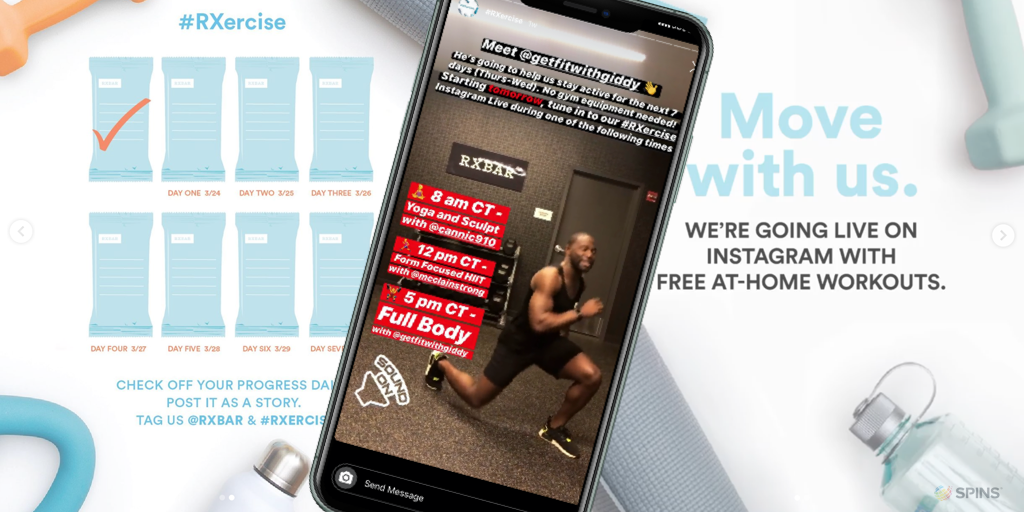
Vital Proteins is redefining WFH
The “WFH” acronym is synonymous with remote work and self-isolation, but Vital Proteins made it their own with the #WellnessFromHome initiative. Not only is the viral collagen brand empowering a vibrant and healthy life at home, they are featuring members of their community as the voice of the initiative.
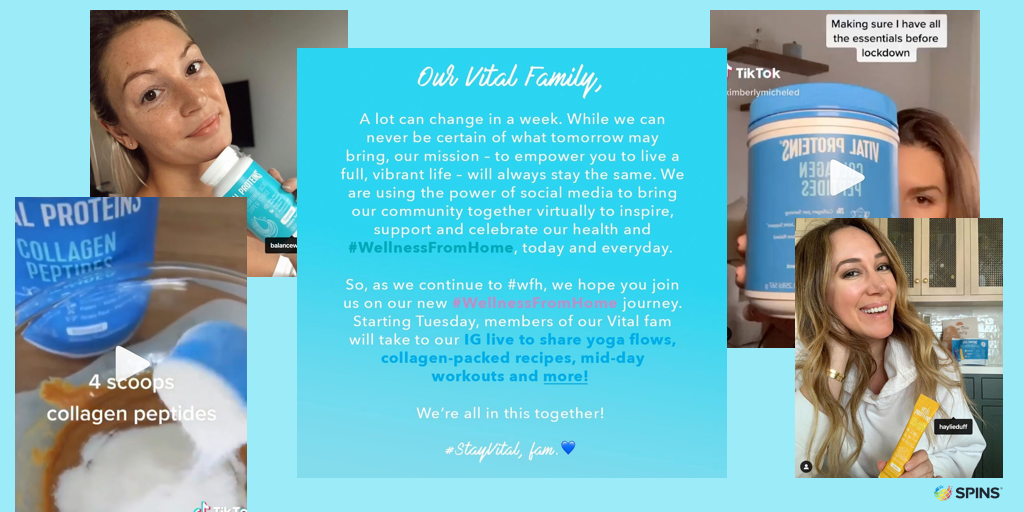
Creating Solutions for Everyone’s Needs
Today’s environment is creating challenges for many. The ability to have access to health and wellness products is needed and welcomed. In light of COVID-19, brands have considered expanding their offering to help those in need. As they say, those you help today will be loyal to you tomorrow.
Distillery is shifting gears to make hand sanitizer
Eight Oaks Distillery wasted no time or resources turning its production line from spirits to hand sanitizer, focusing donation efforts on mission-critical organizations such as EMS, police, and hospitals.
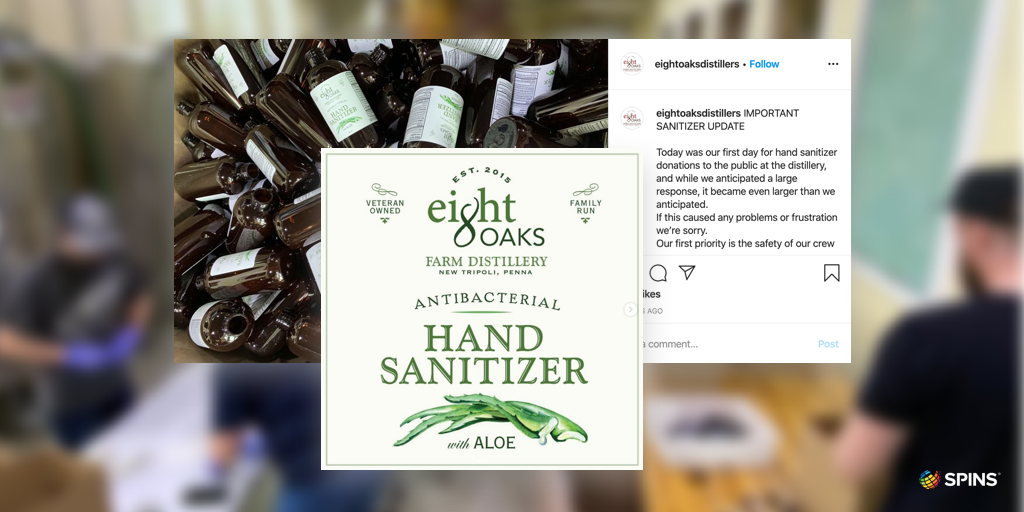
– Image source Eight Oaks Distillery Instagram
Other Half Brewing is supporting hospitality professionals
Hospitality has been crippled in the wake of COVID-19, leaving everyone from GMs to dishwashers out of work. In an effort to raise awareness and support the hard-hit hospitality professionals, Other Half Brewing announced All Together, an “open-ended beer collaboration”, with the goal of providing any and all brewers with tools to create beer at the lowest possible cost. The goal is to have a portion of proceeds from each brewery’s creation support those affected.
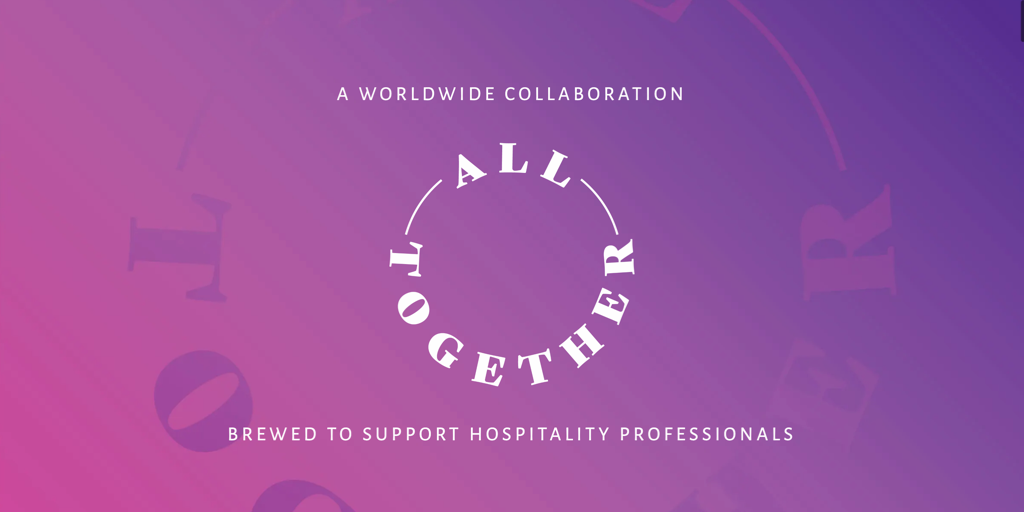
– Image source altogether.beer
As you make these considerations and think about expanding your offering, consider the restaurant and hospitality workers who can help temporarily. They can help you expand your offering and distribution to the new audiences in creative ways.
Expanding Accessibility
For all consumers, going to the grocery store during a pandemic is a serious health threat. For others, finding a product that’s consistent with their means or their lifestyle limitations has always been a challenge. With COVID-19, brands are tasked with become more accessible to those in need (or want).
Sacred Serve is going Uber
Gelato delivered is one thing. Adaptogenic, raw, vegan gelato made from young coconut meat delivered? That’s even better if you ask SPINS. While Uber’s delivery app is usually intended for restaurant delivery, Chicago’s own Sacred Serve is finding ways to keep drivers in business while reaching their fans using Uber Eats.
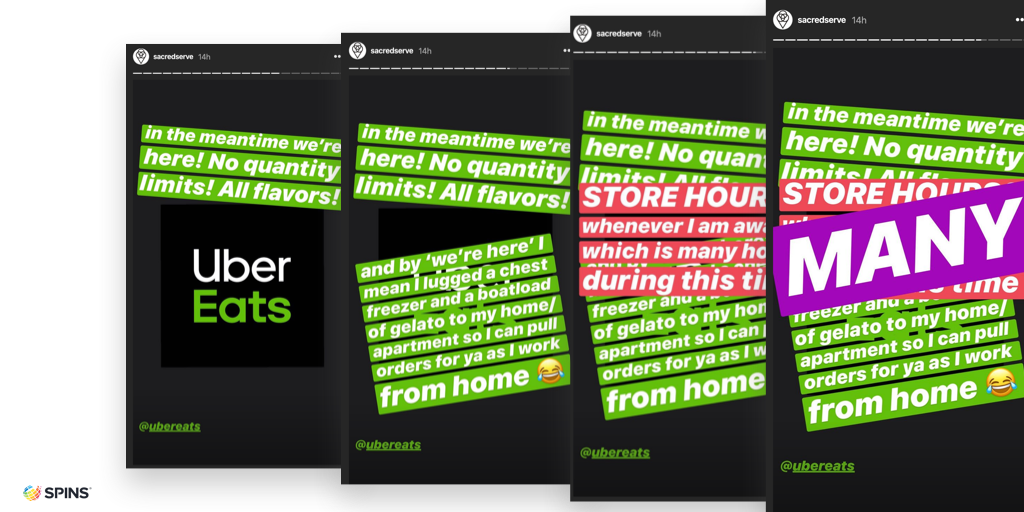
– Image source Sacred Serve Instagram
Working Together
Your extended partner network is having the same thoughts you are. They’re scrambling to figure out how to help, how to support and ultimately how to get healthy products to Americans everywhere in a healthy way. How can we get product to people faster? How can we create solutions that matter? How can we be prepared for what’s next?
Caulipower is Serving Those Who Served
Caulipower is putting their mission-driven foot forward to recognize heroes at a time when heroes are hard to come by. By partnering with U.S.Vets, Caulipower is #ServingThoseWhoServe and making sure veterans and their families are staying nourished.
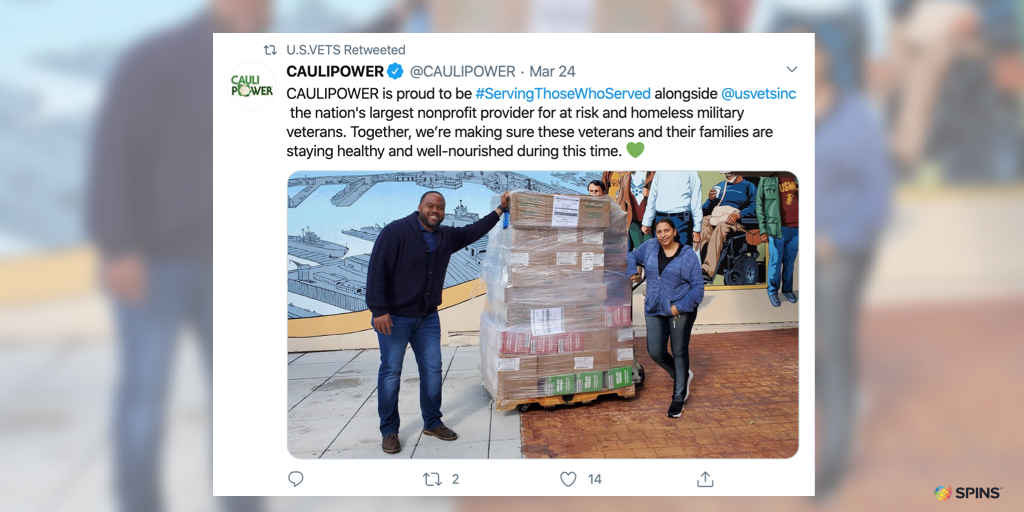
– Image source Caulipower Twitter
Chobani is bringing it home
More often than not, the greatest impact you can make is closest to home. For Chobani, this couldn’t be truer after the Corona Virus broke out in their home state of New York. In response, Chobani CEO Peter McGuinness joined forces with the governor, Feeding America Westchester, and the New York National Guard to distribute more than 35,000 Chobani products to hard-hit areas throughout the state.
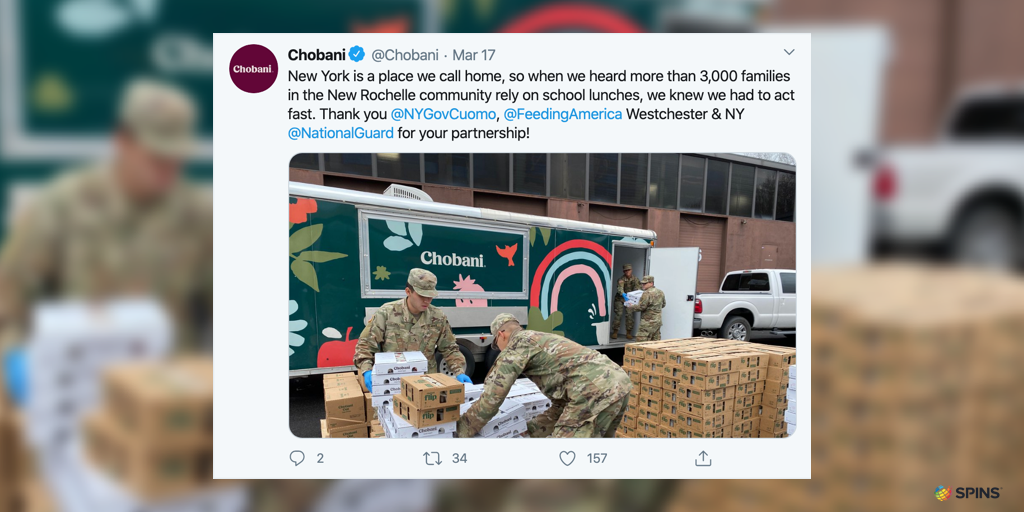
Hu Kitchen is re-allocating their resources for good
You’ve probably seen Hu’s plant-based chocolate on the shelves, but did you know Hu Kitchen is the brand’s flagship restaurant in NYC? As the story goes, COVID-19 forced doors to close, leaving inventory unused and workers concerned.
“After the temporary closing of our NYC restaurant, we knew we couldn’t let all of our fresh food and produce go to waste.”, Hu wrote in a recent Instagram post.
Instead, Hu connected with a local non-profit dedicated to ending hunger throughout NYC and donated 500 lbs of vegetables and 1,200 eggs to those in need. And the generosity did not stop there. Hu committed to donated 20,000 Boxes of Hu Crackers to support food-insecure communities in NYC and for every Hu Cracker box purchased on Amazon, they’re matching that quantity in an equal donation to families most in need.
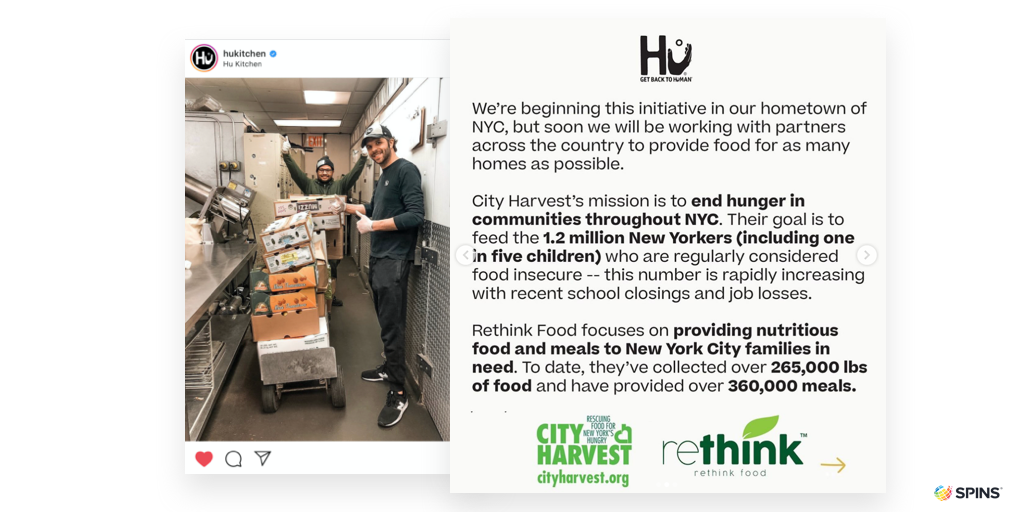
– Image source Hu Kitchen Instagram
Learning and Sharing
We’re all learning a lot. Natural Brands are under pressure to optimize supply chain and protect employees while grocery stores are expected to restock at an unprecedented rate. The more we learn, the more we realize that sharing is caring, especially at a time when it’s all about distancing.
Best practices at The GFB
By sharing an update about their operation publicly, The GFB is not only being transparent with their customers, they’re also informing peers. In a recent Instagram post, the zero-waste protein bar shed light on production policies, audits, and standards that are ensuring a safe production environment.
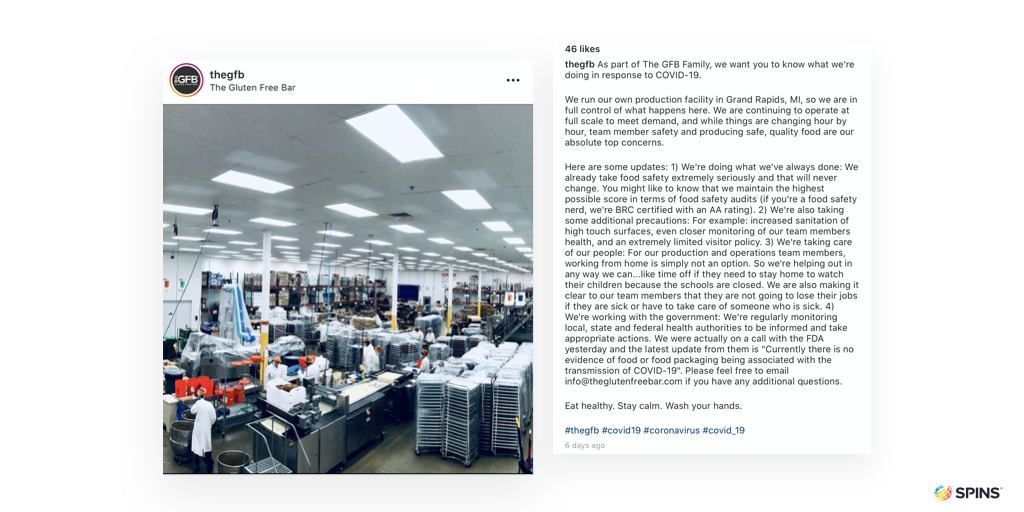
– Image source The GFB Instagram
How The American Baking Association is helping with hiring
Natural or not, the demand for bread has created a major staffing need for bakeries. To help answer the call, the ABA (American Baking Association) is helping its members fill more than 3,000 temporary and permanent jobs. After performing an association-wide survey, the ABA has listed the names and emails of hiring managers for each of its members, organized by state.
In Conclusion
During uncertain time, consumers need and look for comfort in what they know. This especially true when it comes to their homes and what they put in their bodies. Without restaurants open, consumers are home relearning their cooking skills or acquiring new ones. Whether they are trying new recipes or looking for healthy snacks for their children, they’re looking for brands they know and trust. In addition, many consumers are consciously looking for healthier choices and in doing so, they’re looking for brands that are authentic in their mission and the ingredients they put in their products.
With that, we invite you to be part of the discussion. Thank you to all of you that have already shared what you’re seeing and how you’re helping. Help us keep the conversation going so we can all do more.





